Live on the homepage now!
Reader Supported News
Out him for breaking the law
Trump’s legal problems are mounting — with growing probability of criminal prosecutions for his attempted coup, theft of top-secret documents, and tax fraud.
You know where all this is going to end up, right? The Supreme Court.
What are the chance that Trump’s three appointees along with the two rightwing justices already on the high court when Trump was elected, Samuel Alito and Clarence Thomas, will allow the former president to be locked up?
I can’t predict. That they were appointed by Trump or another Republican president does not pose an illegal conflict of interest.
But I’ll tell you what is clearly an illegal conflict of interest: Clarence Thomas’s continued participation in any case arising from Trump’s attempted coup.
A federal law — 28 U.S. Code § 455 — requires that “any justice, judge, or magistrate judge of the United States shall disqualify himself in any proceeding in which his impartiality might reasonably be questioned.”
If Thomas fails to recuse himself from the Moore v. Harper case currently before the Court, he will be breaking that law. The bogus “independent state legislature” theory at the heart of Moore v. Harper was used by Thomas’ wife, Ginni Thomas, to pressure state lawmakers to overturn the 2020 election results.
Given these extraordinary actions by Ginni Thomas in the wake of the 2020 election, surely it’s reasonable to question the impartiality of Clarence Thomas.
Let’s be clear: The legal issue here is not whether Clarence Thomas is in fact impartial. The point of the federal law governing judicial conflicts of interest is to preserve the public’s trust in our legal system by eliminating even the appearance of partiality.
Thomas’s refusal to recuse himself from Moore v. Harper would further damage the integrity of the Court.
The stakes are significant. If the Supreme Court rules in favor of the plaintiffs in Moore v. Harper, Republican-controlled state legislatures could pass harsher voter suppression laws, enact even more gerrymandered maps, and potentially even change how electors are chosen in a presidential election — the specific strategy Ginni Thomas urged after the 2020 presidential election. (The Electoral Reform Act would go some way toward preventing this, but a determined state legislature and governor might use Moore v. Harper to justify it nonetheless.)
What to do about Clarence Thomas’s illegal conflict of interest?
I can think of at least three things (short of seeking to impeach him, which would be a non-starter in the soon-to-be Republican House) that should be done.
Chief Justice John Roberts should publicly state that Thomas must recuse himself from Moore v. Harper because his impartiality might reasonably be questioned.
The Senate should hold public hearings on Thomas’s apparent violation of law, including asking him to testify.
The Justice Department should convene a grand jury to consider whether Thomas has violated the law.
None of these will result directly in a legal finding that Clarence Thomas has an illegal conflict of interest. But they will shine a spotlight on it, pushing Thomas either to recuse himself or explain clearly why he won’t.
No person is above the law — not even someone charged with interpreting it.
READ MORE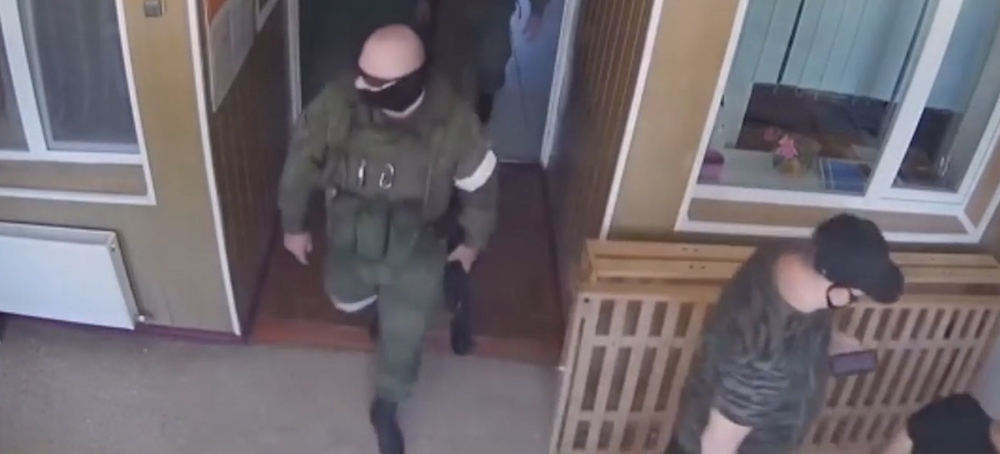 CCTV captures Putin's soldiers raiding Ukrainian orphanage to abduct children. (photo: The Independent)
CCTV captures Putin's soldiers raiding Ukrainian orphanage to abduct children. (photo: The Independent)
At least 52 orphans were sent to the care of locals before Russian soldiers advanced, officials say
Throughout the 10-month invasion of Ukraine, Russian forces have repeatedly been accused of deporting Ukrainian children to Russia or Russian-held territories.
The video footage shows men from Russia’s secret police, FSB, with armed soldiers carrying rifles entering the building. The armed Russian can be seen entering rooms on the premises according to the footage, gathered by Sky News.
Authorities in charge of the orphanage said that they had evacuated the children ahead of time. Volodymyr Sahaidak, the director of an orphanage in the village of Stepanivka outside Kherson, said that he started “hiding children because we understood they would take them", calling it the “scariest thing”.
READ MORE 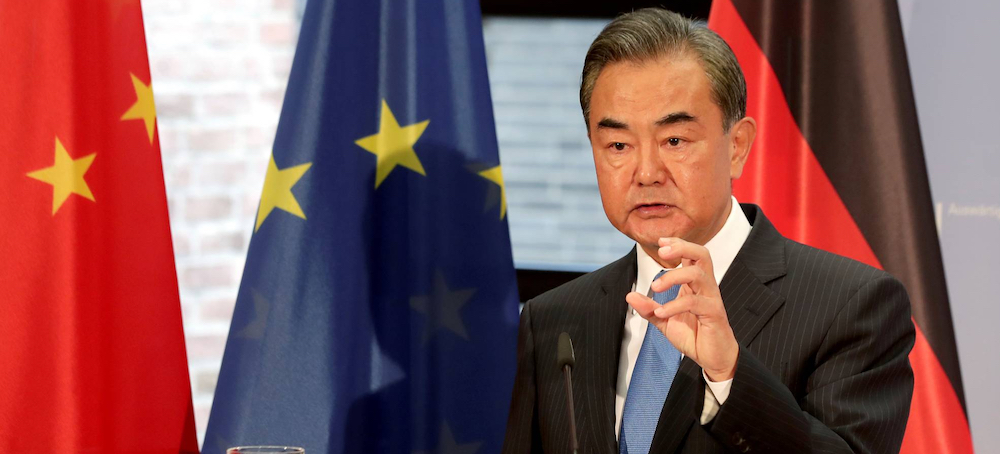 Chinese Foreign Minister Wang Yi. (photo: Reuters)
Chinese Foreign Minister Wang Yi. (photo: Reuters)
Wang Yi accuses the US of ‘salami slicing’ tactics and ‘bullying’ in a call with Secretary of State Antony Blinken.
Wang on Friday accused the US of trying to suppress China’s development. Washington must pay attention to Beijing’s legitimate concerns, he said, warning the US against trying to challenge China’s red lines using “salami slicing” tactics.
He was referring to the practice of using a series of small actions to achieve a much larger result that would be difficult to accomplish with a single large action.
The remarks by Wang underscored the deep tensions that mark relations between the world’s two largest economies, even as their leaders have tried to re-engage in diplomacy in recent weeks.
Chinese President Xi Jinping met US President Joe Biden at the G20 summit in Bali last month, where they discussed a number of hot-button issues, including Taiwan. It was their first in-person talk since 2017.
China considers Taiwan its own territory and believes the US is slowly chipping away at its core interests and challenging its bottom line while being careful to avoid a single drastic action that could give China a clear reason to react with full force.
Biden had raised objections to China’s “coercive and increasingly aggressive actions towards Taiwan”, which he said undermined peace and stability across the Taiwan Strait and in the broader region, and jeopardised global prosperity.
Xi called it the “first red line” that must not be crossed in China-US relations.
Wang stressed that the two sides should focus on translating the Bali consensus of the two heads of state into practical policies and concrete actions, according to a statement from the Chinese foreign ministry on Friday.
“It is necessary to step up consultations on the guiding principles of China-U.S. relations, promote dialogue at all levels, and resolve specific issues between the two countries through joint working groups,” Wang said.
A brief readout from the US State Department said Blinken discussed the “need to maintain open lines of communication and responsibly manage the US-PRC [People’s Republic of China] relationship,” in his call with Wang.
The US side raised “concerns about Russia’s war against Ukraine and the threats it poses to global security and economic stability”.
Wang stressed that China has “always stood by the side of peace and the purposes of the UN Charter”.
“Standing on the side of the international community to promote peace and talks, we will continue to play a constructive role in resolving the crisis in our own way,” the Chinese foreign ministry quoted Wang as telling Blinken.
READ MORE  A man injured in the attack on Saturday. The streets of Kherson were busy on Saturday morning when Russian forces shelled the city center, according to an aide to the Ukrainian president. (photo: Dimitar Dilkoff/AFP/Getty Images)
A man injured in the attack on Saturday. The streets of Kherson were busy on Saturday morning when Russian forces shelled the city center, according to an aide to the Ukrainian president. (photo: Dimitar Dilkoff/AFP/Getty Images)
President Volodymyr Zelensky of Ukraine had urged vigilance after the military noted the presence of Russian ships carrying cruise missiles in the Black Sea.
“With the approaching holiday season, Russian terrorists may become active again,” Mr. Zelensky said in his overnight address. “Therefore, please heed the air raid signals, help each other and always take care of each other.”
His comments came after the Ukrainian military warned on Friday that Russian ships carrying cruise missiles had entered the Black Sea for the first time since Dec. 16, when Moscow fired a barrage of missiles across Ukraine.
The streets of Kherson were busy on Saturday morning when Russian forces shelled the city center, according to Kyrylo Tymoshenko, deputy head of the president’s office. At least 58 people were wounded in the attack, in addition to the seven killed, he said on the Telegram messaging app.
Images posted by Mr. Zelensky on his Telegram account of the attack’s aftermath showed several people and blood in the street, as well as burning cars. He said that they showed “the real life of Ukraine and Ukrainians.”
“In the morning, on Saturday, on the eve of Christmas, in the central part of the city,” Mr. Zelensky wrote. “These are not military facilities. This is not a war according to the rules defined. It is terror, it is killing for the sake of intimidation and pleasure.”
Ukraine celebrates Christmas as a national holiday on Dec. 25 — in line with the Western calendar — as well as on Jan. 7, for churches observing the Eastern Orthodox religious holiday.
The attack on Saturday was only the latest in Kherson, which has been battered by Russian shelling since Ukrainian forces retook the city last month. On Friday, five people in the region were killed and 17 others were wounded, Mr. Tymoshenkso said in an update before the most recent shelling.
The Christmas Eve bombardment, though, prompted a rush of anger.
“While families in Europe, North America, and beyond prepare festive dinners, spare a thought for Ukraine,” the Ukrainian foreign minister, Dmytro Kuleba, wrote on Twitter alongside images of the aftermath.
Bridget Brink, the U.S. ambassador to Ukraine, condemned the “brutal” strike on a city whose citizens had “already suffered so much” when retreating Russian forces cut off power and water to Kherson on their way out.
“Truly horrific, especially on Christmas Eve,” she tweeted.
Russia’s war in Ukraine is now fought in two largely separate arenas: ground battles in the south and east, and air contests between Ukraine’s defense systems and Russia’s cruise missiles and drones aimed at electrical infrastructure. Military analysts say the infrastructure-targeting campaign is intended to demoralize Ukrainians and push their government into a cease-fire that might allow Russia time to regroup and rearm for future offensives.
Since October, Russia has fired volleys of missiles and drones at Ukraine’s energy infrastructure in intervals of roughly a week to 10 days, according to Ukraine’s military intelligence chief. Most barrages have included around 75 missiles.
That tempo is likely set based on Russia’s weapons supply, Britain’s defense intelligence agency said on Saturday.
“Russia has likely limited its long-range missile strikes against Ukrainian infrastructure to around once a week due to the limited availability of cruise missiles,” the agency said in its daily update. “Similarly, Russia is unlikely to have increased its stockpile of artillery munitions enough to enable large-scale offensive operations.”
For weeks, Ukrainian officials have expressed concern that Russian forces could use neighboring Belarus as a launchpad for a new ground offensive, with Kyiv, Ukraine’s capital, a potential target. A rare visit by President Vladimir V. Putin this week to Belarus to meet with his closest regional ally, President Aleksandr G. Lukashenko, amplified those concerns. Mr. Lukashenko, in turn, traveled to Russia on Saturday, state media reported.
But the director of Ukraine’s military intelligence agency said in an interview with The New York Times on Friday that, while the possibility could not be entirely ruled out, a recent flurry of Russian military activity in Belarus was an attempt by Moscow to trick Ukraine into diverting soldiers from the active front line in the southeast of the country.
The Institute for the Study of War, a Washington-based research group, also said in its latest report that there was no evidence that Russia was preparing a strike force in Belarus, and that a renewed invasion from the country was “unlikely” this winter.
Russian forces have “been much more clearly setting conditions for an offensive” in the northwestern part of the Luhansk region, the institute said, citing increased transport of Russian military equipment and personnel to the area.
As Ukrainian officials warned of further strikes, the country was still grappling with the devastation caused by the most recent barrages of missiles.
Ukrenergo, the national electric utility, said on Saturday in a Facebook post that “significant” electricity shortages persisted, with the Kyiv region experiencing the greatest difficulties as a result of Russian attacks on Dec. 19. Those strikes hit a critical piece of infrastructure, and Ukraine’s utilities have been instituting longer and more unpredictable power outages to keep the grid stable.
Ukrainians have grown increasingly frustrated by the weeks of power outages and months of hardship as freezing weather sets in. But they have also adapted: In Kyiv, stationary bikes were powering the lights on some Christmas trees amid the rolling blackouts.
READ MORE 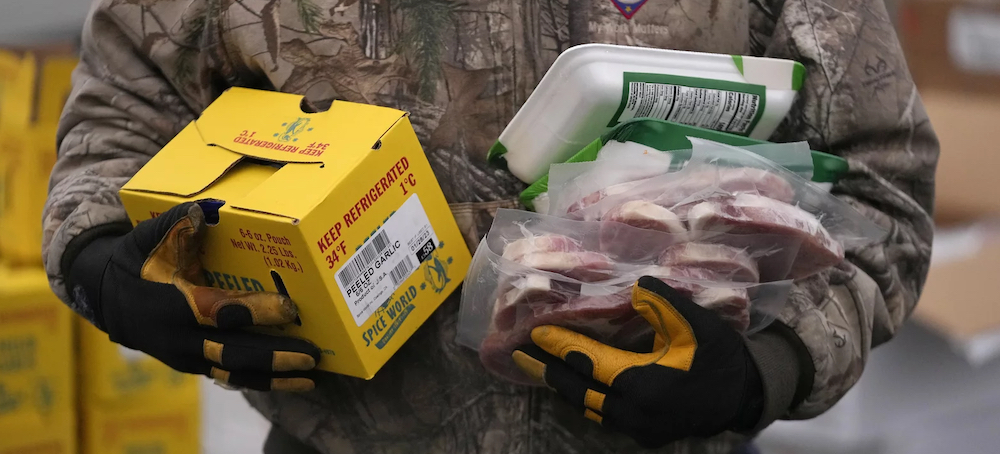 A Utah Food Bank volunteer carries groceries at a food distribution site on Dec. 21, in Salt Lake City, Utah. (photo: Rick Bowmer/AP)
A Utah Food Bank volunteer carries groceries at a food distribution site on Dec. 21, in Salt Lake City, Utah. (photo: Rick Bowmer/AP)
But with inflation, the dollar isn't going as far.
"You would need more charitable giving to keep pace with the rising costs," said Una Osili, economist and Associate Dean of Indiana University's Lilly Family School of Philanthropy. "It's not enough that people are just giving at the same rates."
Plus, many households returned to their pre-pandemic giving habits, choosing to donate to other sectors such as the arts or education, she said.
Harder for a lot of people to donate
DC Food Project, a local nonprofit that helps supply K-12 students and their families with fresh produce and dried goods ahead of long weekends and breaks, has actually seen donations dip.
"During Covid, everyone was hoping and wanting to help if they could," said Lucie Leblois, 44, one of the food project's founders.
Leblois, along with co-founders Alysa MacClellan and Katie DeGroft, started the organization in 2018 and saw it grow quickly during the pandemic.
"We were able to raise money as fast as we were spending it."
But this year, it's a different story.
"People, even if they're generous, may want to donate to other causes," said Leblois. "I think the food insecurity story was a really big one during the pandemic. And unfortunately, it still exists, and in fact is even worse."
Grocery prices have gone way up because of inflation, and access to food has gotten harder. Egg prices have risen nearly 50% this year, government data shows.
"As a nonprofit, we faced that challenge, but we also know that the families we're supporting are doubly facing that challenge," she said.
Burning out staff, running out of food
Food banks in every region of the country are also dealing with high demand and rising food prices — and burnt out staff.
CAPI USA, a Brooklyn Center, Minnesota-based nonprofit originally called the Center for Asian and Pacific Islanders now focused on serving immigrants and refugees, is one of them.
CAPI, which operates a food shelf, is one of the state's only culturally-specific food providers. They focus on Asian, African and Latinx food groups, said Ekta Prakash, the CEO.
"Those foods are expensive," said Prakash, who makes it a mission to purchase fresh produce for CAPI clients. "It's easy to say you can run a food shelf with canned food, but it's not easy to do."
CAPI typically spends $50,000 per year for 400 lbs of food, said Prakash. But this year, she said they've spent nearly $100,000 for roughly the same amount of food, and they're struggling to meet rising demand.
"By Thursday, there is no food," she said.
They've had to reduce the hours of their food shelf, closing on Friday through the weekend.
Plus, while people are still donating food, financial giving by individuals and corporations has slowed, said Prakash. They need money to pay the cost of labor.
"Our staff are getting more burned out," Prakash said.
Need is almost as high as the worst of the pandemic
This is probably the most challenging holiday season that Second Harvest of Silicon Valley has experienced yet, said Leslie Bacho, CEO of the regional food bank.
"The need we're seeing in the community is reaching close to the level that we saw at the height of the pandemic," she said.
Since the surge in demand during the pandemic was tied to job losses, it felt temporary, she said. It's been a different story with inflation, which has pummeled the country for a year now.
"Everyone is really strained," said Bacho. "Both financially, because our network is being hit hard, and also emotionally, just from being in this emergency-response mode."
To contend with the rising price of milk - up nearly 15% over the year - the food bank now gives each family a half gallon of it per box. It used to give a full gallon.
"I try to keep going out to our distribution sites just to remind myself why we are doing this work," said Bacho, who enjoys connecting with volunteers and donors.
"I've tried to remind myself of all the joy that's there as we're all busily working away."
READ MORE 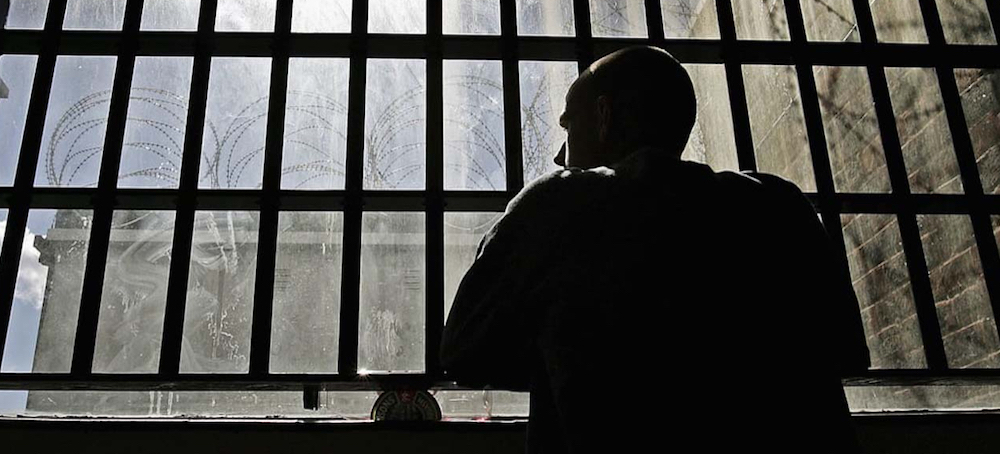 A prisoner. (photo: Peter Macdiarmid/Getty Images)
A prisoner. (photo: Peter Macdiarmid/Getty Images)
Hundreds of thousands of incarcerated people work in US prisons as part of their sentences, often without basic protections and for little to no pay
“That is tied directly into the same type of practices from slavery,” Brown, who is co-founder of the Anti-Violence Safety and Accountability Project, says. “That’s the same practice, the same energy, the same spirit that you see in this prison setting. A person can be on one plantation, and then they’ll be moved to another plantation, and you’ll never see the people who you were with ever again. They can separate you from your wife, separate you from your children, from your family. It’s the same way in the modern-day carceral setting.”
More than 150 years after slavery was outlawed in the US, California remains one of dozens of states in the country that allows slavery and indentured servitude as a punishment for a crime in its state constitution, a vestige of the US Constitution’s 13th amendment. In 2021, an estimated 791,500 incarcerated people worked in US prisons as part of their sentences in 2021, often without basic workplace protections and under dangerous working conditions for little to no pay, according to a June report by the American Civil Liberties Union and the University of Chicago Law School’s Global Human Rights Clinic.
Since 2008, Colorado, Nebraska and Utah have removed such language from their state constitutions. And in November, voters in four states – Alabama, Oregon, Tennessee and Vermont – approved ballot measures that removed such provisions, bringing the number to seven states.
Next year, the Abolish Slavery National Network, a group of organizers involved in movements across the country to end constitutional provisions allowing slavery and involuntary servitude, anticipates that 22 states will have legislation. Their hope is that, as more and more states approve amendments to their state constitutions, so too will Congress and a constitutional convention: removing the language from the US constitution to eliminate the exception. In 2021, Georgia Representative Nikema Williams and Oregon Senator Jeff Merkley reintroduced legislation known as the abolition amendment that would close the slavery loophole in the 13th amendment.
Bianca Tylek, executive director of Worth Rises, a national group lobbying for a federal constitutional amendment, says that removing the exception for slavery and indentured servitude as a punishment for a crime from the US constitution would “establish that all people, especially people who are incarcerated, are deserving the same humanity and dignity”.
“When slavery was legal back in the 1800s, it was rooted in this concept that Black people that were enslaved were less than human,” Tylek says. “When we talk to people who are incarcerated about how they feel are not being protected from slavery by the 13th amendment, the first thing we hear are about feeling less than human – about feeling worthless, about feeling like society doesn’t recognize them.”
Tylek added that the provision’s removal would also “end the brutal practices around prison labor”, a practice enmeshed within the US carceral system since the passage of the 13th amendment in 1865.
An ACLU report from June 2022 about the exploitation of US prison labor noted that the constitutional loophole permitted states to turn to “incarcerated labor as a means of partially replacing chattel slavery and the free labor force slavery provided” and subjected them to brutal conditions that persist today. The loophole gave way to laws during the 19th century such as the so-called Black Codes that empowered authorities to incarcerate Black people for petty crimes and allowed authorities to engage in “convict leasing” where the incarcerated people would work in factories, construction, and elsewhere for long days under threat of brutal punishment.
The threats of punishment have morphed from whipping to solitary confinement and disciplinary notices that could extend people’s prison sentences.
“People incarcerated should not be forced to work under the threat of solitary confinement, under the threat of loss of contact in visits with their loved ones, under the threat of beatings or the denial of parole,” Tylek says. “It means that people who are incarcerated should be privy to the same PPE [personal protective equipment] and training and other types of work conditions that we expect to have a safe and dignified working experience.” That includes, he said, the discussion of minimum wages for work that generated billions of dollars in goods, services, and commodities from their labor in 2021.
Max Parthas, co-director of state operations for the Abolish Slavery National Network, celebrated the wins in November as a “huge historic victory”. He warned that after people serve their time, they remain further disenfranchised as a result of their incarceration: they are not only unable to vote if convicted of a felony, resulting in an estimated nearly 5 million people without that constitutional right, but they also struggle to find work as a result of having a criminal record.
In his experience within the system, Brown says that the continued presence of slavery provisions in state constitutions shows incarcerated people that forced labor “takes precedence over rehabilitation” and public safety. He pointed to the fact that people behind bars can work for years as firefighters and porters yet are unable to find jobs in those professions.
The momentum has been building since Colorado became the first state to remove the slavery and servitude language from their state constitutions. In recent years, widespread prison strikes, most notably in 2018 and most recently in Alabama ahead of the election, have elevated awareness of the harsh conditions that incarcerated people navigate.
An effort in Louisiana faltered in November after the ballot measure’s sponsor asked voters to reject the proposal because of its confusing language. Organizers expect to bring that initiative back to the state’s ballot. In California, an effort to pass the California Abolition Act, which Brown helped write while in prison, failed after lawmakers rejected it.
The measure, introduced in 2020, had mostly navigated through the legislature unopposed until the California department of finance estimated that it would cost the state $1.5bn to pay inmates minimum wage – a projection that Jamilia Land, who co-founded the Anti-Violence, Safety and Accountability Project with her husband Brown, argued missed the point. For her, the action showed that even in an outwardly liberal state, the “vestiges of white supremacy” still persist in California.
“It feels like a slap in the face,” Land says. “Because we are California, we are supposed to be this great liberal state.” Land sees inspiration toward a comeback in successful efforts in states like Alabama and Tennessee, where the deep historic roots of enslavement are better known. Pastor Kenneth Glasgow, the Rev Al Sharpton’s half-brother who helped with the campaign in Alabama, says recent victories show the elimination of such slavery and indentured servitude provisions can cut across political lines through coalition building.
“We take away the slave language and start healing America as a whole,” Glasgow says. “As the South goes, so goes the nation … we are going directly to the wound to address the injury. We’ve got to stop putting bandaids on these lacerations.”
Despite the growing movement, little has changed so far in the states that have already approved constitutional changes. As more and more states consider removing the slavery exceptions, organizers expect the courts to clarify what the changes mean in practice and force correctional institutions to reform. Earlier this year, in February, thousands of prisoners in Colorado sued the governor, Jared Polis, and the state’s department of corrections over its guidelines that require prisoners to work and claimed it violated the state’s amended constitution.
Kamau Allen, who helped organize the Colorado initiative and is former lead organizer of the Abolish Slavery National Network, has taken time away from organizing to go to law school at the University of Wisconsin. Part of what drove him was the fact that the “legal ramifications of ending slavery in the constitution are a little bit unknown”.
But the consequences on people’s lives were clear and resonant: during his work on the Colorado campaign, he often thought of his uncle’s experience incarcerated– “his story of forced labor, his story of maybe being paid sometimes, and even on moments, even on days when he was paid, it was garnished for restitution”. Organizers argue that the possibilities for reform, whether through enfranchisement of incarcerated people and the restoration of their rights after prison or a renewed focus on workplace protections and even wages for those still inside, are vast, and the removal of slavery provisions represent the first step in fulfilling that possibility.
“This is all decided in the courts,” Allen says.“This could also motivate people as well. We received a lot of concern from people about whether or not what we’re doing is just symbolic. And the litigation efforts give this movement teeth. It makes it real. It makes it count for something more than symbolism.”
READ MORE 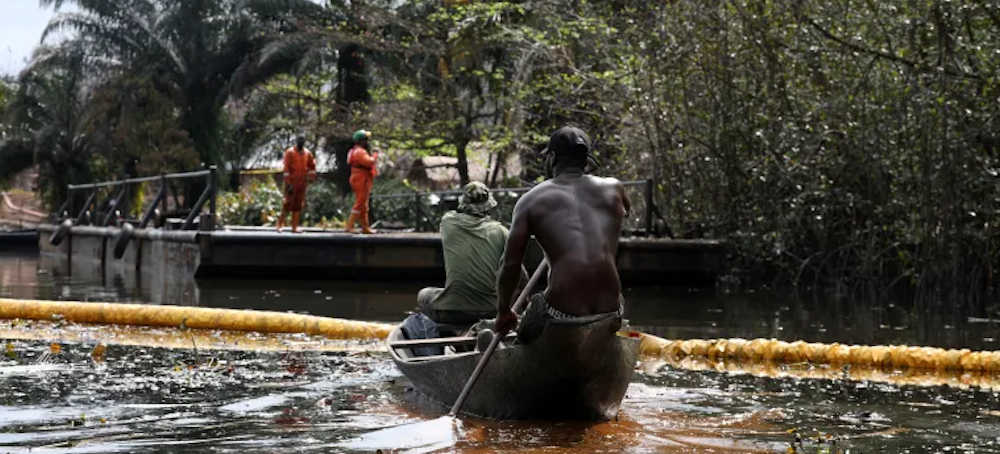 Members of the Nembe community paddle a canoe across Santa Barbara River following the oil spill. (photo: Temilade Adelaja/Reuters)
Members of the Nembe community paddle a canoe across Santa Barbara River following the oil spill. (photo: Temilade Adelaja/Reuters)
Shell has agreed to pay $16m (£13m) to four Nigerian farmers and their communities to compensate for damage allegedly caused by pollution coming from leaks in its oil pipelines.
But it is being given on the basis of "no admission of liability", a joint statement says.
Nigeria's oil industry has been a major source of environmental damage.
The oil spills in this case happened from 2004 to 2007 and the pay out follows a decision last year by a Dutch court that the Nigerian branch of Shell was responsible for the damage.
Shell had argued that the leaks were a result of sabotage.
Shell's headquarters were in the Netherlands until early this year. Campaigners hailed the 2021 court decision as the first time a multinational had been deemed legally responsible for what a subsidiary did.
"Thanks to this compensation we can build up our community once again. We can start to re-invest in our living environment," Eric Dooh, the son of one of the farmers who launched the case in 2008 alongside the Dutch branch of Friends of the Earth, said.
The money will be going to communities in Oruma, Goi and Ikot Ada Udo.
Although the amount of compensation is not huge, this development is seen as a milestone for rural communities across the Niger Delta region and environmental activists, the BBC's Ishaq Khalid reports.
Oil pollution continues to damage the health and livelihoods of many in the area.
The four farmers who began the case - Barizaa Dooh, Elder Friday Alfred Akpan, Chief Fidelis A Oguru and Alali Efanga - said the leaks from underground oil pipelines had cost them their livelihoods by contaminating land and waterways.
Mr Efanga and Mr Dooh have died since the case was first filed so their sons pursued the case instead.
As well as compensation, last year's court ruling ordered Shell to set up a leak early detection system. This has now been installed, the joint statement by Shell and Friends of the Earth said.
Follow us on facebook and twitter!
PO Box 2043 / Citrus Heights, CA 95611



No comments:
Post a Comment
Note: Only a member of this blog may post a comment.